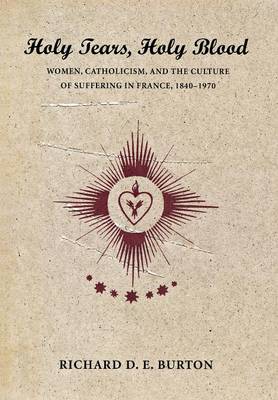
Stock image for illustration purposes only - book cover, edition or condition may vary.
Holy Tears, Holy Blood: Women, Catholicism, and the Culture of Suffering in France, 1840-1970
Richard D. E. Burton
€ 110.47
FREE Delivery in Ireland
Description for Holy Tears, Holy Blood: Women, Catholicism, and the Culture of Suffering in France, 1840-1970
Hardback. Num Pages: 320 pages, 6. BIC Classification: 3JH; 3JJ; HRCC7; JFSJ1. Category: (G) General (US: Trade); (P) Professional & Vocational; (U) Tertiary Education (US: College). Dimension: 167 x 241 x 27. Weight in Grams: 632.
In Holy Tears, Holy Blood, Richard D. E. Burton continues his investigation of Catholic France from Revolution to Liberation. From his focus in Blood in the City on public demonstrations of the cultural power of Catholicism, he now turns to more private rituals, those codes of conduct that shaped the interior lives of French Catholic women and determined their artistic and social presentation. Here there is rather less blood, and considerably more weeping, Burton says. In portraits of eleven women, including Simone Weil and Sainte Therese, he traces the lasting power of particular expressions of suffering and sacrifice. How, Burton asks, does a rapidly modernizing society accommodate the cultural-historical legacy of religious belief, in particular the extreme conservative beliefs of ultramontane Catholicism? Burton pays particular attention to the doctrine of vicarious suffering, whereby an individual suffers for the redemption of others, and to certain extreme forms of religious experience including stigmatization, self-starvation, visions, and apparitions.
Product Details
Publisher
Cornell University Press
Format
Hardback
Publication date
2004
Condition
New
Weight
631g
Number of Pages
320
Place of Publication
Ithaca, United States
ISBN
9780801442070
SKU
V9780801442070
Shipping Time
Usually ships in 7 to 11 working days
Ref
99-1
Reviews for Holy Tears, Holy Blood: Women, Catholicism, and the Culture of Suffering in France, 1840-1970
In Holy Tears, Holy Blood Richard D. E. Burton explores with great sensitivity a powerful current in modern Catholic devotional life, the doctrine of mystical substitution, which calls on innocent victims (generally women) to suffer sickness, hunger, poverty, and in extreme cases, the stigmata, in order to redeem a corrupt world. Through a series of eleven biographical sketches Burton shows the different paths that French women could take in embodying this ideal-including the 'little way' of Therese Martin, the 'Little Flower' who accepted suffering but opposed self-mortification, and the harsh asceticism of Simone Weil. Burton's work combines a profound empathy for the women he writes about with a critical spirit that confronts the troubling dimension of a spirituality in which self-sacrifice approaches masochism. Readers of Holy Tears, Holy Blood enter a world that is both beautiful and appalling, and which has shaped the lives and thoughts of millions of Catholics over the last two centuries. -Thomas Kselman, University of Notre Dame Holy Tears, Holy Blood is a fascinating, wide-ranging, and erudite analysis of faith and spirituality in the lives of twelve French Catholic women in the nineteenth and twentieth centuries. It is an impressive achievement on its own as well as a worthy sequel to Blood in the City. Richard D. E. Burton's focus on suffering in this highly original book substantially broadens and deepens our understanding of French Catholic spirituality. -Sarah A. Curtis, author of Educating the Faithful: Religion, Schooling, and Society in Nineteenth-Century France Richard D. E. Burton is a lively writer and a brilliant scholar who has traced out a theme of religious agony in France that is highly original. All of Burton's books are worth studying but this one may be his best yet! -Edmund White, Director of Creative Writing at Princeton University Holy Tears, Holy Blood sets out to explore an extremely powerful pre-Vatican II world that seems incomprehensible to us today and has now practically vanished. Largely literary in expression, the 'culture of suffering' described by scholar and author Richard Burton appealed to social and intellectual elites, attracting numerous converts to Catholicism. . . . Burton's work overflows with riches that recover tragic lives now nearly forgotten. Their world-one predating antibiotics, blood transfusions, microsurgery, and protease inhibitors-is hard to read about and even harder to imagine. -Stephen Schloesser, Commonweal, September 24, 2004 Burton continues the examination of nineteenth-century French Catholicism he began in Blood in the City. . . . As in his previous work, he boldly uses 'secular suffering,' from sadomasochistic pornography to the Tour de France to the fate of the alleged 'horizontal collaborators' of WWII, as a comparative model. As with all such books, this one invites debate and rebuttal; at once respectful but intelligently interrogative, it will inform and challenge religious, intellectual, and cultural historians. -Choice The doctrine of mystical substitution, sometimes known as vicarious suffering, calls upon innocent believers to endure hunger, poverty, sickness, and even stigmata in order to redeem a corrupt world. Richard D. E. Burton's provoking book demonstrates the extent to which the doctrine permeated French Catholic discourse and religious practice during the nineteenth and early twentieth centuries, as radical Catholics sought to redeem France from secular republicanism. -Sarah Howard, Times Literary Supplement, October 15, 2004
